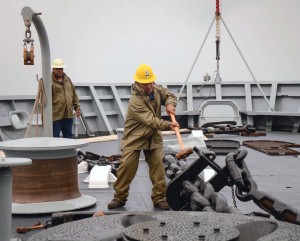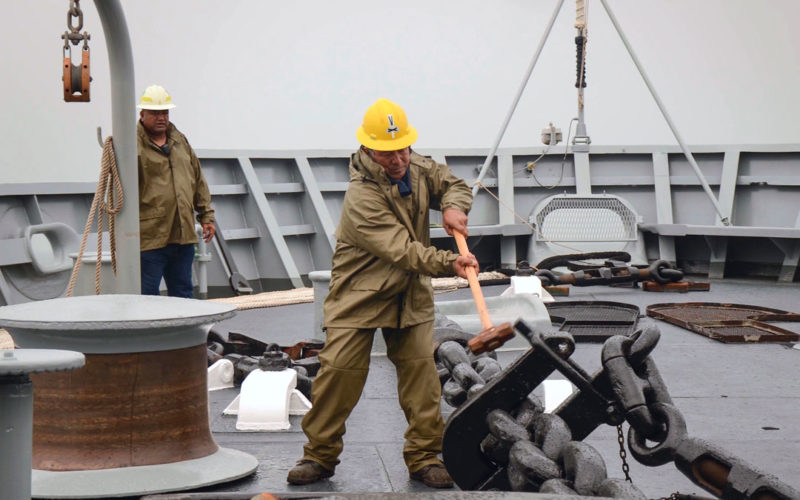
As the COVID-19 pandemic gripped the planet in March, a “gangway up” order by the Military Sealift Command (MSC) restricted thousands of civilian mariners to U.S. Navy vessels around the world. Five months later, “civmars” are feeling stressed, neglected and chained to their jobs — if not actually physically confined — by a complexity of coronavirus-related circumstances.
Meanwhile, their unions are pursuing a grievance with the MSC, hoping to recover penalty pay for the hours they spent stuck on ships, and also to send a message that stranding civmars on vessels — while Navy personnel and contractors came and went freely — was unacceptable.
“Pay is the only thing we can request as a grievance,” said Tracy Burke, the government fleet representative for the Marine Engineers’ Beneficial Association.
The MEBA and two other seafarer unions hope the MSC will pay an hourly rate for the time the mariners were in port, some just a few miles from their homes, but were ordered not to leave their vessels. The larger point: “If they hadn’t restricted only the civmars, there wouldn’t be an issue,” Burke said.
The order and its consequences are straining the relationship between the Navy and the civilian workforce that repairs, resupplies and helps crew U.S. military vessels around the world. While enlisted personnel will endure restrictions and hardships with a “Yes, sir,” civilian mariners expect more freedom, even within a career that’s always meant long deployments and a military-style sense of dedication.
“I’m seeing it as an inflection point,” said Dr. Sal Mercogliano, who teaches maritime and military history at Campbell University in Buies Creek, N.C. “The military needs mariners, but a mariner is not a sailor.”
Rear Adm. Michael Wettlaufer, the MSC’s commanding officer, issued the order restricting civmars to their vessels on March 21. He cited a need for “swift implementation of actions that will protect the health of our afloat units.” The MSC did not respond to a request for comment for this story.
According to civmars who spoke to Professional Mariner, safety was compromised when Navy personnel and Defense Department contractors came aboard the ships and left at will, breaking the health bubble and potentially exposing crewmembers to the coronavirus.
About 10 weeks after Wettlaufer’s order, ship captains were given discretion to allow civmars to leave their vessels when in port, providing some respite from tight quarters and tense crewmates. However, their plight is still complicated by the pandemic. Deployments have been extended for months, and even those who quit contractually have to wait for someone to relieve them. Ever-changing travel restrictions also have made getting home more difficult.
Not planning for a pandemic, civmars lacked the masks and protective gear that have become household basics. Some lacked basic necessities. A civmar whose vessel was restricted to Naval Station Norfolk (Va.) in April said she pleaded with an officer to bring her tampons and deodorant. The ship was docked just a few miles from her apartment. She asked to remain anonymous due to concerns about her career.
While Navy officers were relieved by colleagues, the mariner said that for months she received no indication about when they would rotate in new civmars and allow those on the ship to go home.
“There were no guidelines for when they would relieve us,” she said. “As long as you were on the ship, you stayed with the ship. There’s no plan.”
Her deployment, which started in January, was extended for months. She stayed with the vessel as it sailed to another naval base for repairs. She is now in a hotel, with the freedom to travel five miles from the building. She doesn’t know when she will return home and suspects other civmars may not want to take an assignment to relieve her for fear of also getting trapped on a ship.
Another civmar, an engineer who has been attached his ship since August 2019, was confined for three months due to COVID-19. The vessel is now in Guam, as is he. He can’t return to his home in the Philippines, where his partner and children live, because the country is not admitting American citizens due to the continuing rise in coronavirus cases in the U.S.
The man, who recently turned 40, said the events of the past six months have caused him to rethink his relationship with the Military Sealift Command.
“This is a good job, particularly as a young man,” he said, “but once you get older, I’m not sure.” He spoke on video chat, smoking a cigarette outside a Guam bar as a few lights from the base punctured the night sky.
He said he hopes to get penalty pay for all the hours he was stuck on the ship, one action stipulated in his contract. Other than that, he doesn’t know what recourse he can demand.
“I’ll just sit here,” he said. “It’s like I’m a machine. I just go and work.”

